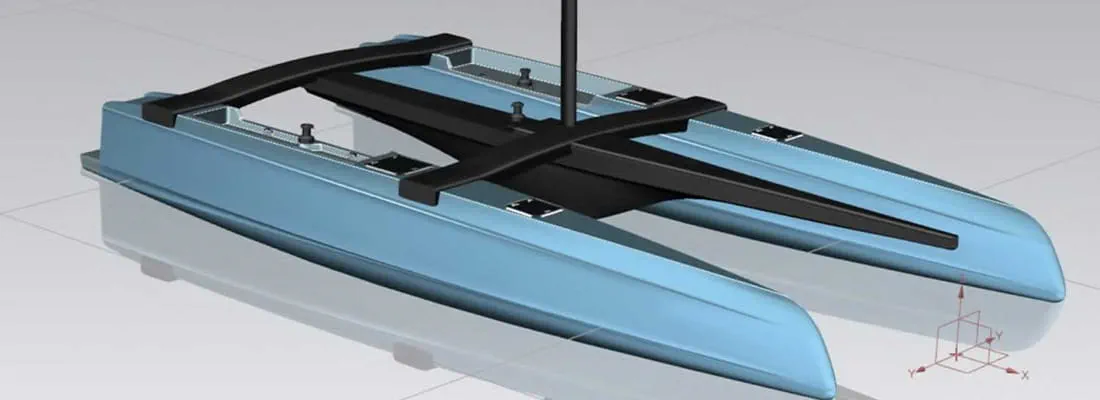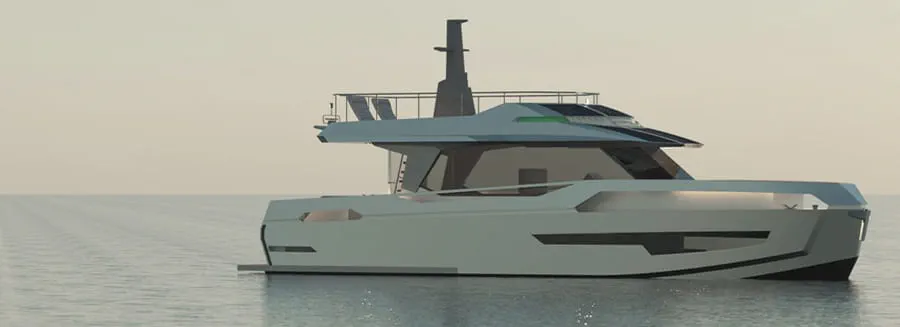At METSTRADE 2019 the I-nnovationLab stage hosted several speakers bringing news of interesting developments in more sustainable boat building concepts.
For instance, Barbara Amerio from Italian Yard Amer Yachts explained how she was pushing ahead with introducing a new fully recyclable composite construction material matrix made from volcanic fibre and a bio resin. Friedrich Deimann of Greenboats in Germany presented details of his Flax 27 Daysailer, a boat built from 80% recycled and sustainable materials. Whilst Igor Kluin from Netherlands based Vaan Yachts, introduced his R4 sailing catamaran, built from recycled aluminium, and with lots of other naturally occurring sustainable materials incorporated into the overall construction.
This trend, towards a break away from the traditional materials and onboard systems that have dominated the recreational boating market for half a century, will undoubtedly gather pace in the coming years, with consumers becoming more aware of their impact on the environment, and starting to demand products with proven Green credentials.
No doubt this year’s METSTRADE will see more developments in this direction, and the now well-established forums and presentations at the I-nnovationLab will be a launch pad for even more new concepts. In the meantime, we are keeping an eye on the market, and checking out some more of these trend setters.
TYNC Design, youthfully challenging the status quo
TYNC stands for ‘The Young Naval Creators’ a title that neatly sums up the philosophy of the organisation’s founding partner Jeroen Wats; A Dutchman with an ocean racing background, who was motivated to start a design agency based in Valencia. Approaching their work with an open-minded approach and no fixed preconceptions, Jeroen’s team consists of a like-minded younger generation of naval architects.
Like a lot of sailors and marine industry players, many of whom have spoken on the subject of Sustainability at METSTRADE during previous years, Jeroen was becoming appalled at the huge waste of material resources, due to millions of boats reaching ‘end-of-life’ over the coming decades without having commercially feasible disposal recycling, or up-cycling solutions in place.
So, from first base, his team have set out to partner with innovative material suppliers, and to design a range of power and sail boats that have recyclability at their core, by utilising emerging eco composite materials, and lightweight sandwich constructions, combined with electric or hybrid propulsion systems. Jeroen says, “we don’t want to see any of our boats going to landfill, they are all designed and constructed from 80% recyclable materials, so they can be deconstructed and separated when they reach end-of-life.”
TYNC have also cut production times by up to 40%, by exploring new ways to use composite materials, and have strived to continuously reduce weight. For instance, their ‘La Belle Verde’ a sailing catamaran which is already popular as an eco-friendly day charter boat, has been redesigned as a new model with a 50% reduced weight; at 1,750 kg - down from 3,500 kg.
Other designs in their portfolio, include a monohull sustainable performance racing yacht, branded as the Eco26; and a 32ft day sailer made from sustainable and recycled materials, equipped with zero emission electric propulsion, and able to be transported in a 40ft shipping container. And on the power boat side, a ‘cradle to cradle’ eco RIB design, an 8 metre tender, built from sustainable and recycled materials which can be powered by an all-electric 50kw outboard, with zero emissions, and fully meeting CE Category C regulations.

Greenaval, the clue is in the name
Naval Yachts based in Turkey, were set up as a design and naval architecture studio back in 2008, and within a couple of years they had taken the step to open a shipyard, where they could turn their designs into reality. By 2015 they had launched their Greenaval brand, offering a range of cruising motor yachts which appeal to owners looking for a more environmentally friendly way of going boating with the family.
Appropriate choice of construction material was high on the list for the new eco-designs, and the yard decided to avoid the composite hull route, as they wanted something that was recyclable, light, strong, and easy to work with. Also avoiding the necessity for continuously producing moulds, which in themselves become an unnecessary waste stream. Having had experience of building steel hulled yachts in the past, the yard was able to technically assess the pros and cons of that material as well. This led them to ultimately choose aluminium, which they say has the highest strength to weight ratio of any boat building material other than composites.
They point out that an aluminium boat hull weighs about 30% less than a comparable size steel vessel, and of course less weight means less energy for propulsion, thus resulting in reduced fuel costs and emissions over the lifetime of the boat. Superior corrosion resistance exhibited by aluminium compared to mild steel, also offers savings on longer term maintenance costs. Last year the yard announced the launch of two production models in the Greenaval series, with the choice of four different propulsion packages; a full-green option, electric motor, hybrid system, or diesel engine.
The 14.3 metre GN47 can cruise for 2 hours on electric only drive with a range of 20Nm, relying only on her solar panels. Or fitted with an optional DC generator, her range will stretch to 2,000Nm at a leisurely 6 knots. Larger families with more money to spend can opt for the GN60, an 18.3 metre aluminium hybrid trawler yacht with 3 cabins, plus a crew cabin. A typical propulsion set up is via two 370hp Volvo Penta diesel engines, and two 150kW electric motors. This combination offers 16 knots cruising speed with the diesel option, and 11.5 knots on electric drive only.
Don’t forget to check out the latest in sustainable boat building developments, and electric / hybrid propulsion systems, by visiting the I-nnovationLab at METSTRADE 2020.






